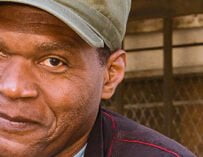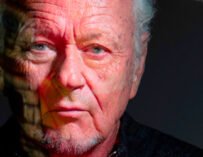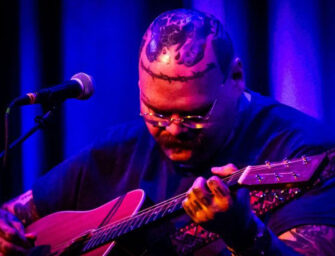The legendary singer, songwriter and guitarist talks about the challenges of collaborating, selecting tracks, and making a song your own
Ohio-born William Royce Scaggs – better known as Boz – is an award-winning, chart-topping, genre-spanning, songwriter and performer. He gained fame in the 70s with several solo singles in the US, including Lido Shuffle and the Grammy winning Lowdown, from his critically acclaimed breakthrough album Silk Degrees, which peaked at No 2. While he records infrequently, when he does it’s an event. More recent recordings – including 1997’s Come On Home, 2013’s Memphis, 2015’s A Fool To Care and this year’s Out Of The Blues – all reflect his lifelong obsession with R&B, soul, and blues, which originally captured his attention as a high-school student and budding musician growing up in Oklahoma and Texas.
Although, as we quickly discover, it was many thousands of miles away that Boz’s career as a songwriter was born…
Can you recall the first song you ever wrote?
“It was called Baby’s Calling Me Home. It was a song I wrote when I was living in Europe. I think it was written in about 1965 and I was living in Stockholm at the time. I spent about a year travelling in Asia and I think it really took shape there. It’s sort of a minor jazzy little thing that I recorded on an album when I was with a band in about 1969.”
Until that point weren’t you just playing the standards, so what compelled you to have a crack at writing yourself?
“Well, I guess after I’d played live in high school bands and when I was travelling I did all sorts of music in all sorts of places, and with different musicians… I don’t know, it was just a melody that went through my head and began taking shape on the guitar for me. It was just one of those melodies that go around and it was my first experience – I didn’t consciously sit down to write a song. It just happened to be something that continued and words began to appear, and there I was.”
Who were your musical heroes when you were growing up?
“I grew up listening to the radio so I listened to everything and I had many, many heroes. It was the early age of rock ‘n’ roll so the usual: Fats Domino, Chuck Berry and Ray Charles. I grew up in Oklahoma and Texas, so I had access to a lot of blues and rhythm & blues that were indigenous to that part of America, and not so far from New Orleans. So that was easily accessible and all the music that came out of New Orleans like jazz and some early rock ‘n’ roll like Little Richard. I had a lot of heroes but I have to place high above them people like Jimmy Reed, Ray Charles and Chuck Berry.”
Over the years you’ve created some fantastic albums where you managed to mix cover versions with your own songs. How do you go about selecting tracks for each LP?
“Well, there have been quite a number of records and they’ve all come at different periods of my development and reflect my songwriting. It was very important in the 70s when there seemed to be a premium placed on people who sang their own songs. We had the brilliant examples of your Beatles and our Bob Dylan, who inspired many of us. So it’s hard to say. On any given project there’s a different point of view, there’s a different reason for it. It changes, so there’s no set way.
“But for instance, I’ve just finished an album that completes a trilogy of albums where I spent time with a producer, a drummer named Steve Jordan. We literally went through hundreds of songs, if not thousands, just batting back and forth things that had a particular interest. I’ve also done a couple of tours and some work with Michael MacDonald and Donald Fagen. I formed a performing outfit in which we explored a lot of songs among the three of us.
“So you just sit through the multitude of songs and you find something that seems to fit the time and place where you are in your life. We all have an abiding love and respect for great rhythm & blues music, from Marvin Gaye and Sly & The Family Stone to… all of it! So it’s really fun, sifting through all that material with other like-minded professionals and finding those grooves or a particular lyric, or that spark which ignited that particular song.”
“Another very important aspect of it is the process of making it your own – you must possess that song and give it your own style. It must fit your voice and the way you can deliver, so every song must be vetted in terms of how your voice projects into that material.
“On the other hand, I’m not a songwriter that has everything written before I go in – a lot of it is improvised in the studio. Most of it originates with music first, with me. So I’ll create a platform, a rhythm track, and live with that long enough to let the spirit of the music tell me what it’s about. And then I begin in the blanks, according to the mood, the emotion that the music inspires in me.”
So is it like a stream of consciousness where you let the song grow organically?
“That’s a good way to describe how it happens sometimes. I love the music, it’s the rhythm and it’s the chord progression that comes to me first –
of course I have an idea of structure – but then it becomes a matter of answering the call by just feeling it and letting it evolve.”
How long do you give for that part of the process? Are you going around in a loop with the backing track for 10 minutes or are we talking hours? Do you let things percolate for days on end?
“Sure, it can take days or it can happen very quickly. Once you find a few key phrases, you expand upon that, of course. Sometimes it’s a title, sometimes it’s just an incidental line, but it’ll establish something and you just try that on. I’ll go through, easily, five, ten or twenty pages of legal pad for an idea and you distil it more and more. I usually do it in one action. Sometimes I’ll come back to a song, but usually I’ll get 90 percent of it in a session – it could be an hour or it could be a week.”
Do you prefer writing alone for that early stage?
“I don’t enjoy the collaborative process. There are very few people that I’ve found successful as writing partners. It’s just that I’m so vague about my own ideas – it’s such a wide, sweeping range that I don’t know how to collaborate in close quarters in that way. I’ve tried it; it freaks me out!”
Is it because you need that time and space to work out where the song is going?
“Yes. Although, that said, I have several collaborators, one of whom is Jack Walroth. I used about six of his songs on my recent record and I’ve recorded a number of his over time.”
Why do you work so well with Jack?
“I don’t really know. I think it’s because he has a wonderful, adventurous spirit about his work. He’s a poet and he’s not afraid to go into very abstract forms. He’s a wordsmith, he loves to turn a word around and play with various facets and meanings, and we have fun at it. We can sit around for hours and throw things at the wall and pick up the pieces.”
So is that the process that you tend to follow with each other?
“Again, music is first. He’s a fine musician and singer, with a definite style, so between the two of us we’re both stylistically oriented. We can take a song, we can sense the phrasing and we know what belongs there. Then it’s just a matter of picking it out of the air and kicking it around long enough before the right piece to the puzzle falls out.”
We were looking back through the long list of people you’ve worked with over the years and see that Steve Miller was an early presence…
“It was very short. I never wrote with him. We really didn’t collaborate on anything creatively at all.”
How about when you had the guys from Toto?
“That was an important collaboration. I was putting together a section using Los Angeles studio musicians and I called a great drummer, who had become a friend, by the name of Jim Keltner. I asked him if he could do the sessions with me, and he wasn’t able to because of previous commitments, but he suggested
I call a young drummer named Jeff Porcaro. Jeff was working with a section of a couple of other friends that were really getting a lot of recognition around LA at the time. I arranged to meet up with them and to try a couple of tracks with them, and the section itself – the bass player, drummer and keyboard player – were extremely impressive together.
“It was suggested by the producer that one of them, the keyboard player David Paich, was a terrific writer and arranger, and that we should go away for a few days and see what we could come up with between us. We spent a weekend at a studio with a piano in it and we wrote Lowdown. We brought that back to the band and recorded it, and that was the beginning of a great collaboration and one of the most fun records I ever made. That was Silk Degrees, so that was important and I’ve worked with each of the members of that little trio pretty extensively after that, but as a writing partner, David Paich was very important to my career. I had a similar collaborative experience with David Foster. Again, they were consummate professionals in all facets of songwriting and production and performance, so I gained an awful lot of traction in my career and in my creative process by working those guys.”
Did you have a different approach with David Paich compared to the one you described with Jack?
“Oh completely different. Jack is a lyric-writing partner, whereas my collaboration with David Foster or David Paich was a matter of starting from the very beginning and looking for the music, and then I wrote the lyrics to everything. But it was so vividly clear when we worked together that it made the process really slick and effective for me as a singer and a lyricist.”
We’re particularly fond of your 1997 album Come On Home. Were you pleased with that one?
“Come On Home was one of my favourite records to make, I was thoroughly and totally satisfied with the way that came out, it was a wonderful experience.”
I’ve Got Your Love was covered by Roger Daltrey recently. Was that a surprise?
“Of course, it was a great surprise. I don’t get a lot of covers for my songs, so I was thrilled. And I heard Pete Townshend played guitar on it so I’m extremely pleased that they chose that song.”
Are you going to be touring in the UK at all?
“No plans for the UK, my schedule is full with just American shows and the release of the new album. I haven’t been in the UK for many years and I would absolutely love to play again there, and I’m hoping circumstances come up that make that possible.”
Interview: Aaron Slater







































Related Articles